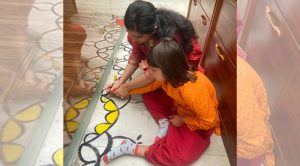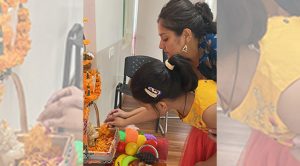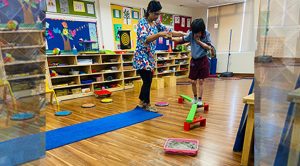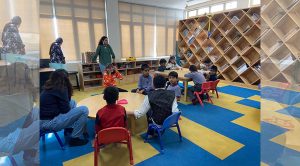“I can talk, sense and feel! I can do many-many more things, which you can’t! We are God’s Special Ones!”
New Year 2023 is here with blossoming hopes and aspirations. The last two years have been extremely traumatic for all of us all over the world! However, we cannot profess that we are safe now from the onslaughts of covid. We have to be extremely cautious as the situation once again seems to go haywire with stats of new variants of coronavirus flowing in from different parts of the world. Let us be cautious and alert. If we are, we can learn to cope with the same. In 2023, I want you all to be empathetic towards our Specially Abled children, and in this, I feel the mentor’s role is very important. Parents and children, both have to be strong emotionally and be able to walk through the society, which is ever ready to judge them. Social skills help all children know, how to act in different social situations – from talking to grandparents to playing with friends at school. A mentor helps in developing social and emotional compatibility in children struggling in their life’s paths despite being endowed with some unique life qualities~ Editor

From The Author’s Desk
Social skills can help your child make friends, learn from others and develop hobbies and interests. These skills can also help with family relationships and give your child a sense of belonging. Social skills’ development improves quality of life and helps in decreased anxiety, stress, and depression. Social skills are a person’s ability to effectively interact and communicate with others through words, actions, and body language. If we increase social skills in children battling mental health issues, we see adaptability in academic learning as well and better adjustment in all walks of life. That doesn’t mean that social skills make you smarter; it means that these skills make you more amenable to learning.
Social skills are learned over time and are not always automatic. People vary in terms of development of Social Competencies Let’s understand what is Autism and what are its challenge as Autism Spectrum Disorder (ASD) is a neurodevelopmental disorder with associated problems in social communication and social interaction across multiple contexts, and restricted or repetitive behaviors or interests. Impairment in social functioning is a central feature of ASD. Current research suggests that there is no single cause of autism, but rather multiple causes working together in a cumulative way, and multiple paths leading to the disorder.

People with ASD often lack in social skills, specially having deficiency in initiating interactions, responding to the initiations of others, maintaining eye contact, sharing enjoyment, reading the non-verbal cues of others, and taking another person’s perspective. These simple interactional processes are challenging for children with Autism.
Many children and adults on the autism spectrum need help in learning how to act in different types of social situations. They often have the desire to interact with others, but may not know how to engage friends or may be overwhelmed by the idea of new experiences. When the challenges of autism are understood and appropriately addressed, and the autistic individual is accepted for who they are, the potential is no less than a neurotypical person. Too many professionals look at autism as something that needs to be controlled and contained. We look at autism as a neurodiversity that needs to be understood. Once understood, then the person’s potential can be realized. There are some aspects of autism that are disabling and very challenging. Nevertheless, seeking to understand the neurodevelopmental differences in an effort to promote growth and development can help the autistic individual reach their potential while addressing the disabling aspects. Children with disabilities, especially autism spectrum disorders, often need to be taught appropriate social interactions, such as making requests, initiating interactions, sharing, exercising reciprocity (give and take), and turn taking.
People with ASD may also have different ways of learning, moving, or paying attention and difficulty learning Social Skills.

At Special Education Department, MRIS – 46, Social competencies with ASD are developed by following ways –
- Various group activities are conducted in the department for developing and enhancing social skills among children with ASD, such as, circle time (prayer, greetings among kids, calendar activity), story sessions, and turn taking activities.
- On special occasions children are given outside exposure with picnics and educational trips.
- Engaging the children in activities based on sharing and caring behaviors, i.e., sharing lunch boxes, making buddies etc.
- Group activities related to speech and language (discussions of various events and festivals around the year).
- Engaging the children in group exercises (crossing hurdles, brain gym, PT sessions) as well as free play sessions.
Family and Parents can practice the following too-
- Conversation skills – for example, choosing what to talk about or what body language to use
- Emotional skills – for example, managing emotions and understanding how others feel
- Problem-solving skills – for example, dealing with conflict or making decisions in social situations.
- Play skills – for example, taking turns in games or sharing toys. You can practice play skills with your autistic child by using toys to act out scenes. For example, you could hug a teddy, then feed teddy and put it to bed, have a tea party with a few teddies, or create a story using a play set like a farm, petrol station or airport.
- Younger children might like movement games like red light/green light, hide-and-seek or tag. Or you could just roll, bounce or kick a toy or ball between you. Older children might like to play games like Connect Four, Jenga or card games.
- Prompting your child to take turns and follow rules, and praising your child when they do, will help your child learn. For example, you can say ‘My turn’ and ‘your turn’. When your child lets you have a turn or follows a rule, you could say ‘Good taking turns’ or ‘Well done for saying Uno!’
- Practicing a skill in different play situations will help your child learn to use the to one another, feeding a teddy, putting pieces of a puzzle together, or playing a game like Connect Four or cards games like snap or Uno.
- Give your autistic child plenty of praise and encouragement when you see them interacting positively with others. For example, when you see your child offer a toy to another child, smile and say, ‘Wow! That is so friendly. You shared your blocks with your friend and waited your turn’.
- You can use role-play before play dates and other social events. For example, you and your autistic child could do a role-play where your child suggests what to play with the other child
- Play the games that the children might play together.
- Practice talking about things like what you’ve been watching on TV or what you did on weekend.

For older children you could also try setting up situations that involve a social problem – for example, having one piece of cake left over for two people. Then you could role-play possible solutions, like both people sharing the cake. Other social problems could include not liking what has been cooked for dinner, not having a turn on the computer, or losing a sibling’s toy.
Many children with autistic spectrum disorders can learn the fundamentals of relating, communicating and thinking. With a comprehensive, affect, relationship-based approach to intervention, children can learn to enjoy closeness, warmth and intimacy, and can love others very deeply.
Children with autism are NOT intellectually impaired they can be incredibly smart and not so smart just like their neurotypical peers. People often incorrectly assume that an individual with autism has reduced intelligence. This is a dangerous assumption and one that undermines the autistic from reaching their fullest potential. They are highly warm, empathetic, caring individuals with friends and they are also doing well academically. They need to be understood and supported appropriately by anyone and everyone they are in contact with.
Showing Empathy to a Special Need child is also very important and essential.
Empathy is not only the ability to recognise how someone feels, but it also values and respects the feelings of another person, treating them with kindness, dignity, and understanding. It is a way of showing your child that you know what they are going through, even if you cannot understand it completely. It’s a good idea to talk to your child about emotions and how others experience them. Encourage your child to express anger, frustration or feeling of discouragement. Give their feelings name and let them know that it is normal for them to experience these emotions. Teach them to experience emotions positively. Listen to them and create an empathetic environment that is open to expressing. It will help them connect to their feelings and eventually, they will learn how to calm themselves and regulate emotions.
When you practice empathy yourself, other people in the house will also learn to be empathetic towards their family and siblings. While some children have the gift to be compassionate, most children need to see empathy modeled by adults around them. Take an interest in the things that matter to your child and respond positively and with care. They will learn the skill of empathy by observation. Unlike being sympathetic where you feel sorry, and lower your expectations, being empathetic will help you find solutions while maintaining high standards.
Unlike Autism , where impairment in the Social Functioning is a key feature, everyday social interaction can be extremely challenging for a child with special needs too as communication is not one of their strong suit too. Children with learning Disabilities often ‘speak in different languages’ when they are trying to communicate. For example, a child may say that ‘Math’ is boring for them, where as they mean to say is that ‘I do not understand Maths’ or ‘ I already know’ etc. If you empathize with your child and listen carefully, you will realize that they want to communicate, and you can revive your actions accordingly, setting aside judgement and frustration. It means parents may have to make mutual communication a success, where rather the onus of making themselves clear is less on the child and you , as a parent and teacher,make extra efforts to get the correct meaning out of what they want to say.
At Special Education Department, MRIS – 46 Emotional empathy for children with special needs is developed by following ways –
- Parent counseling sessions.
- Encourage children to express their needs through various modes, such as, pictures, flash cards, verbal communication as per their respective level.
- Child counseling on frequent basis or as per the requirement.
- Use of Alternate Augmentative Communication (AAC) method.
- Music Therapy
- Art Therapy
When you empathize you try to understand things from child’s perspective putting your feelings aside. As much as it is crucial to understand the need to be empathetic, it is equally important to learn to talk empathetically. The act of stopping and thinking before you react will help you give perspective and your child the empathy they need.
So, together let’s make an Educational Resolution to support children with special needs including Autism and approach them with Emotional Empathy and understanding. Together with warm concerns we can help Special Needs Students build Social Competencies.
References:
- www.autismparentingmagazine.co
- www.psychiatry.org
- www.webmd.com
- www.autismspeaks.org
- https://www.ncbi.nlm.nih.gov/pmc/articles/PMC6105175/National Library of Medicine
Author: Ms. Promila Anjali Mehta, Sr. Counselor, MRIS- Sector 46, Gurugram.





